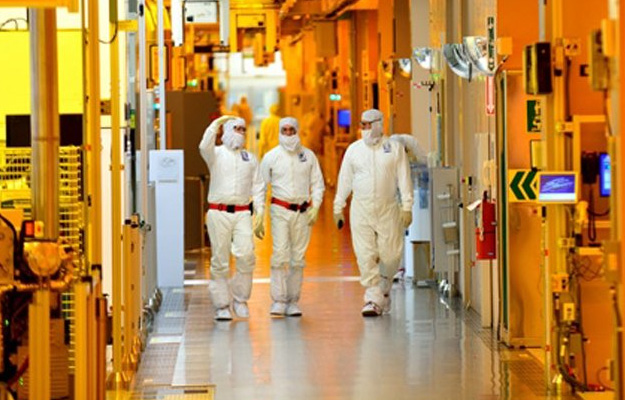Intel’s 10nm+ Ice Lake Processors Confirmed As Next Generation After Coffee Lake Family
Intel is promising "amazing performance and responsiveness" from its Ice Lake processor family, and in doing so has officially confirmed the successor to the 8th generation Core processor family. Not many details were shared—other than hyping up the performance, Intel said its Ice Lake chips will be built on its 10-nanometer+ (10nm+) process technology, which will succeed Cannon Lake.

Following all of these product names can be a bit confusing, so we will try to clear things up as best we can. On Monday, August 21 (same day as the upcoming total solar eclipse), Intel will launch its 8th generation Core processor line based on its Coffee Lake architecture. As the successor to Kaby Lake, Intel's Coffee Lake family will be the fourth iteration of 14nm processors, and essentially a second optimization of the architecture.
Here is a look at Intel's microarchitectures dating back to Haswell:

Intel previously released new processor families based on an "tick-tock" schedule, with each "tick" representing a die shrink (process) and each "tock" representing a new microarchitecture. In early 2016, Intel abandoned its tick-tock cadence and replaced it with a three-phase model of Process > Architecture > Optimization. Assuming Intel is sticking with that approach, Coffee Lake can be considered a second Optimization in the cycle of Process (Broadwell) > Architecture (Skylake) > Optimization (Kaby Lake). Either that, or Intel is abandoning its new release model.

In any event, Cannon Lake will be a new process and the first to be built on a 10nm manufacturing processor, followed by Ice Lake bearing the 9th generation Core processor tag. Intel recently talked about its technology enhancements and said that Cannon Lake will provide up to a 25 percent uplift in performance, while consuming 45 percent less power than 14nm counterparts (i.e., Skylake and Kaby Lake).

From there, Intel provided metrics for an enhanced 10nm process on its roadmap called 10++ that adds another 15 percent performance increase and up to a 30 percent drop in power consumption. Intel has not yet shared any details on Ice Lake's 10nm+ process, but we can assume it will also offer a bump in performance while running more efficiently, just to a lesser degree than its eventual 10nm++ successor.
Intel's shrink to 10nm has been a long time coming. Getting to 10nm has been more challenging than Intel anticipated, resulting in delays. Most of those challenges must now be in the rear view mirror, hence Intel's willingness to jump ahead and start talking about Ice Lake.

Following all of these product names can be a bit confusing, so we will try to clear things up as best we can. On Monday, August 21 (same day as the upcoming total solar eclipse), Intel will launch its 8th generation Core processor line based on its Coffee Lake architecture. As the successor to Kaby Lake, Intel's Coffee Lake family will be the fourth iteration of 14nm processors, and essentially a second optimization of the architecture.
Here is a look at Intel's microarchitectures dating back to Haswell:
- Haswell: 22nm, 4th generation Core family
- Broadwell: 14nm, 5th generation Core family
- Skylake: 14nm, 6th generation Core family
- Kaby Lake: 14nm, 7th generation Core family
- Coffee Lake: 14nm, 8th generation Core family

Intel previously released new processor families based on an "tick-tock" schedule, with each "tick" representing a die shrink (process) and each "tock" representing a new microarchitecture. In early 2016, Intel abandoned its tick-tock cadence and replaced it with a three-phase model of Process > Architecture > Optimization. Assuming Intel is sticking with that approach, Coffee Lake can be considered a second Optimization in the cycle of Process (Broadwell) > Architecture (Skylake) > Optimization (Kaby Lake). Either that, or Intel is abandoning its new release model.

In any event, Cannon Lake will be a new process and the first to be built on a 10nm manufacturing processor, followed by Ice Lake bearing the 9th generation Core processor tag. Intel recently talked about its technology enhancements and said that Cannon Lake will provide up to a 25 percent uplift in performance, while consuming 45 percent less power than 14nm counterparts (i.e., Skylake and Kaby Lake).

From there, Intel provided metrics for an enhanced 10nm process on its roadmap called 10++ that adds another 15 percent performance increase and up to a 30 percent drop in power consumption. Intel has not yet shared any details on Ice Lake's 10nm+ process, but we can assume it will also offer a bump in performance while running more efficiently, just to a lesser degree than its eventual 10nm++ successor.
Intel's shrink to 10nm has been a long time coming. Getting to 10nm has been more challenging than Intel anticipated, resulting in delays. Most of those challenges must now be in the rear view mirror, hence Intel's willingness to jump ahead and start talking about Ice Lake.

